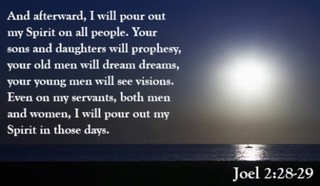
Change Translation
- Recent Translations
- All Translations
Joel 2:11
Share
Listen to Joel 2:11
Settings
Scripture Text Size
11
O SENHOR levanta a sua vozà frente do seu exército.Como é grande o seu exército!Como são poderosos os que obedecem à sua ordem!Como é grande o dia do SENHOR!Como será terrível!Quem poderá suportá-lo?
Joel 2:11 Meaning and Commentary
Joel 2:11
or numerous, as both the locusts and Chaldeans were: for [he is] strong that executeth his word;
or "strong is it"; namely, the camp and army of the locusts; which, though feeble in themselves, separately considered; yet being in such large bodies, and the Lord at the head of them, and strengthened by him, were able to fulfil his word; which he can make the least and meanest of his creatures do: or the Assyrian or Chaldean army, which was both numerous and mighty: which the Targum may refer unto, paraphrasing the words,
it?
the day appointed by the Lord to take vengeance on the Jews for sin; and this, being the day of his wrath, is very dreadful and intolerable; so any season may be called, in which God remarkably pours down his wrath on men of their sins; see ( Revelation 6:17 ) . Such was the time of Jerusalem's destruction, both by the Chaldeans and Romans.
FOOTNOTES:
F21 Ibid. (Nat. Hist. l. 11. c. 29.)
And the Lord shall utter his voice before his army
Either the army of the locusts, whom Pliny F21 calls "pestis deorum", "the plague of the gods"; and the Arabians frequently style them the army of God. It is a tradition of theirs that locusts fell into the hands of Mahomet, with this inscription on their backs and wings,
``we are the army of the most high God;''and because they were, for that reason Mahomet made a law that none should kill them; (See Gill on Revelation 9:3). These creatures are certainly at his beck and command; he can "command the locust to devour the land", ( 2 Chronicles 7:13 ) ; which may be meant by his uttering his voice here; though Jarchi and Kimchi interpret it of the Lord's giving notice of this judgment by his prophets before it fame: or this may design the army of the Assyrians or Chaldeans, of which the locusts were all emblem, and which were of the Lord's mustering together, and was at his command; and who is here represented as a General at the head of his army, making a speech to them to animate and encourage them to the battle, and to give them the word of command when to begin the onset: for his camp [is] very great;
or numerous, as both the locusts and Chaldeans were: for [he is] strong that executeth his word;
or "strong is it"; namely, the camp and army of the locusts; which, though feeble in themselves, separately considered; yet being in such large bodies, and the Lord at the head of them, and strengthened by him, were able to fulfil his word; which he can make the least and meanest of his creatures do: or the Assyrian or Chaldean army, which was both numerous and mighty: which the Targum may refer unto, paraphrasing the words,
``for strong are the executors of his word:''for the day of the Lord [is] great and very terrible, and who can abide
it?
the day appointed by the Lord to take vengeance on the Jews for sin; and this, being the day of his wrath, is very dreadful and intolerable; so any season may be called, in which God remarkably pours down his wrath on men of their sins; see ( Revelation 6:17 ) . Such was the time of Jerusalem's destruction, both by the Chaldeans and Romans.
F21 Ibid. (Nat. Hist. l. 11. c. 29.)
Taken from John Gill's Exposition of the Bible
Unlock Deeper Insights: Get Over 20 Commentaries with Plus! Subscribe Now
Joel 2:11 In-Context
9
Lançam-se sobre a cidade;correm ao longo da muralha.Sobem nas casas;como ladrões entram pelas janelas.
10
Diante deles a terra treme,os céus estremecem,o sol e a lua escureceme as estrelas param de brilhar.
11
O SENHOR levanta a sua vozà frente do seu exército.Como é grande o seu exército!Como são poderosos os que obedecem à sua ordem!Como é grande o dia do SENHOR!Como será terrível!Quem poderá suportá-lo?
12
“Agora, porém”, declara o SENHOR,“voltem-se para mim de todo o coração,com jejum, lamento e pranto”.
13
Rasguem o coração e não as vestes.Voltem-se para o SENHOR, o seu Deus,pois ele é misericordioso e compassivo,muito paciente e cheio de amor;arrepende-se e não envia a desgraça.
Biblia Sagrada, Nova Versão Internacional®, NVI® Copyright © 1993, 2000 by Biblica, Inc.™ Used by permission. All rights reserved worldwide.
